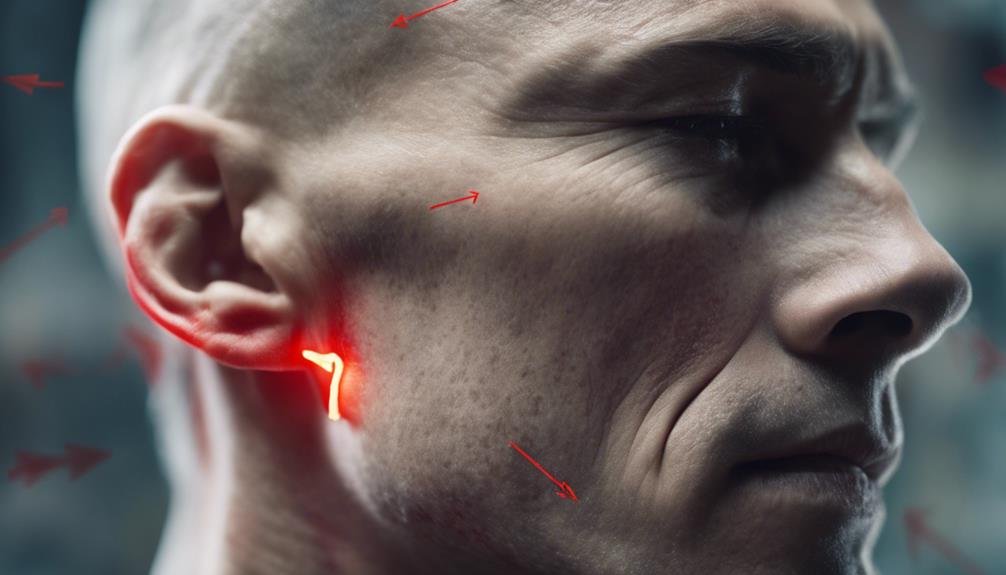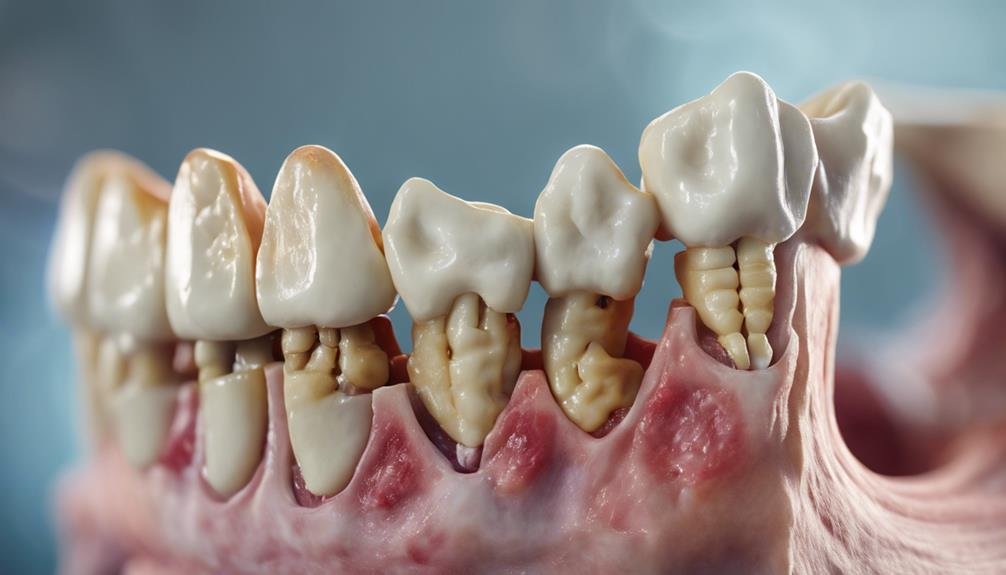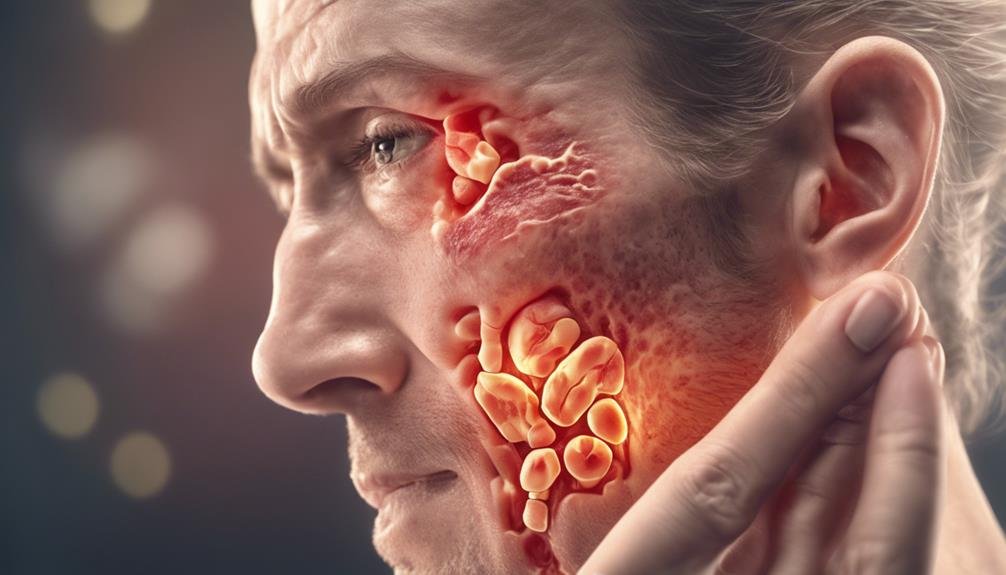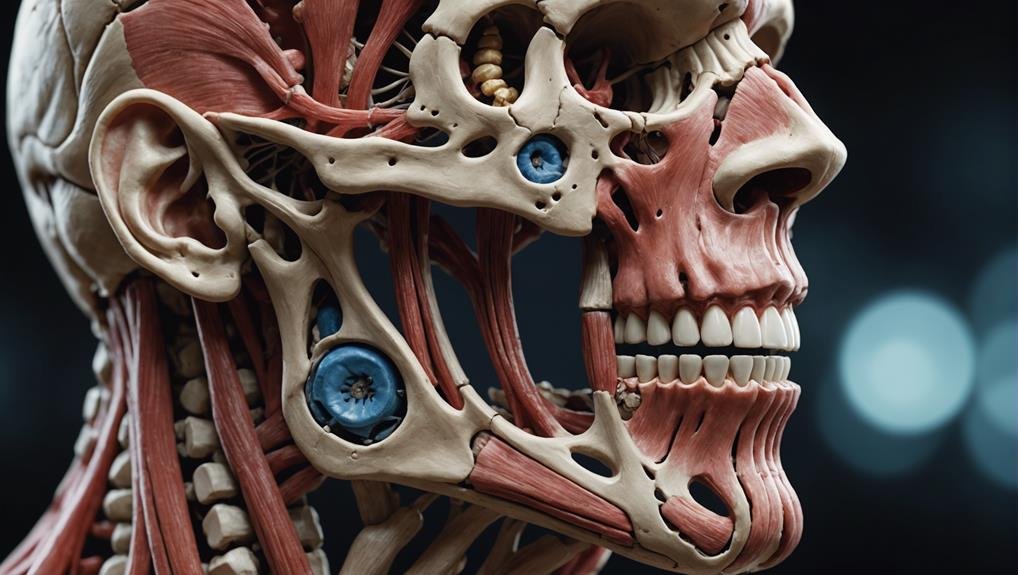You might notice jaw pain near your ear and wonder what’s causing it. This discomfort can stem from several issues, such as TMJ disorder, dental problems, or even arthritis. Identifying the root cause is essential, ranging from something as simple as teeth grinding to more complex conditions like rheumatoid arthritis. Left untreated, this pain might worsen, affecting your daily life. Understanding the potential sources and what you can do about them is key. So, let’s explore the various conditions behind that persistent jaw pain and what steps you can take next.
Key Takeaways
- TMJ disorders can cause significant jaw pain that radiates to the ear.
- Dental issues like cavities or teeth grinding often lead to jaw and ear pain.
- Sinus infections can result in inflammation and pain extending to the jaw and ear.
- Arthritis, including osteoarthritis and rheumatoid arthritis, can cause jaw pain near the ear.
- Early diagnosis and treatment are crucial for managing jaw pain effectively.
Causes of Jaw Pain

Jaw pain near the ear can stem from several underlying conditions, including temporomandibular joint disorder (TMJD), dental issues, ear infections, sinusitis, and arthritis. Understanding the causes helps in timely diagnosis and treatment.
TMJD is a common culprit, affecting 10-15% of adults. This disorder can lead to jaw pain that radiates to the ear.
Dental issues such as cavities, abscesses, and bruxism (teeth grinding) are also significant causes of jaw pain near the ear. These dental problems can create pressure and discomfort in the jaw area, which you might mistakenly attribute to your ear.
Ear infections and sinusitis are other potential factors to take into account. Infections in the ear can lead to inflammation and pain that extends to the jaw. Similarly, sinusitis can cause pressure and pain near the ear and jaw due to sinus congestion.
Arthritis, particularly osteoarthritis or rheumatoid arthritis, can affect the temporomandibular joint (TMJ), leading to pain and inflammation in the jaw near the ear.
Prompt diagnosis and treatment are essential to address these underlying causes effectively. If you’re experiencing persistent jaw pain near your ear, consult a healthcare professional to determine the exact cause and get appropriate treatment.
TMJ Disorder
TMJ disorder is one of the most common causes of jaw pain near the ear, which affects the temporomandibular joint and the muscles around it. When you have TMJ, the joint connecting your jaw to your skull is compromised, leading to inflammation, facial pain, and discomfort in the ear area. This can greatly impact your quality of life, making everyday activities like eating and talking painful.
Here are some common causes of TMJ disorder:
- Wear and tear: Over time, the cartilage in your TMJ can wear down, leading to pain and inflammation.
- Injury: Trauma to the jaw or head can trigger TMJ issues.
- Stress: High stress can cause you to clench or grind your teeth, straining the TMJ.
- Conditions like fibromyalgia: These can exacerbate or contribute to TMJ problems.
Medical treatments for TMJ disorder aim to alleviate the symptoms and improve functionality. Options include mouthguards to prevent teeth grinding, physical therapy to strengthen jaw muscles, and surgery to repair or replace the joint in severe cases in severe cases.
If your jaw hurts or you experience ear and jaw pain, seeking timely treatment can significantly improve your daily life.
Osteoarthritis Impact

Osteoarthritis of the temporomandibular joint (TMJ) often leads to significant pain and stiffness, affecting one’s ability to perform daily activities. This condition results from wear and tear on the cartilage in the TMJ, which can cause severe jaw pain and earache.
The deterioration of cartilage means your jawbones rub against each other, leading to inflammation, discomfort, and reduced jaw function.
Early diagnosis of osteoarthritis in the TMJ is essential. If you notice persistent jaw pain, earache, or stiffness, consult a healthcare professional for an accurate diagnosis. They might use imaging tests and physical examinations to determine the extent of cartilage damage in your TMJ.
Once diagnosed, effective treatment options can help manage your symptoms and improve your quality of life.
Treatment for TMJ osteoarthritis may include medications to reduce pain and inflammation, physical therapy to restore jaw function, and lifestyle changes to minimize stress on the joint. In severe cases, surgical interventions might be necessary.
Prompt and appropriate treatment can prevent complications and help you maintain better jaw function, allowing you to continue your daily activities with less discomfort.
Rheumatoid Arthritis
When rheumatoid arthritis affects the temporomandibular joint (TMJ), it can lead to significant pain and discomfort in the jaw and ear. As an autoimmune condition, rheumatoid arthritis causes the immune system to mistakenly attack the joints, leading to inflammation and joint pain. This inflammation in the TMJ can make daily activities like eating and speaking quite challenging.
Common symptoms you might experience include:
- Ear and jaw pain: Pain can radiate from the TMJ to your ear, making it feel like you have an earache.
- Stiffness in the joint: The joint may feel stiff, especially in the morning or after periods of inactivity.
- Difficulty chewing: Inflammation and pain can make it hard to chew your food properly.
- Joint damage: Over time, untreated inflammation can lead to significant joint damage.
Timely diagnosis and treatment are essential to managing symptoms and preventing further joint damage. A multidisciplinary treatment approach, including medication, physical therapy, and lifestyle modifications, can help you manage the condition more effectively.
Psoriatic Arthritis

Experiencing jaw pain near your ear could indicate psoriatic arthritis affecting your temporomandibular joint (TMJ). Psoriatic arthritis is an autoimmune condition that can cause joint pain, including in the TMJ. You might notice symptoms like swelling, stiffness, and significant discomfort in your jaw and surrounding areas. This joint pain often radiates to the ear, causing ear pain and impacting your daily activities.
Inflammation from psoriatic arthritis can make your jaw feel sore and stiff, especially in the morning or after periods of inactivity. This can lead to difficulties in chewing, speaking, and even yawning.
The inflammation isn’t just limited to your jaw; it can extend to the ear, compounding your discomfort.
Prompt diagnosis and treatment are essential. Early intervention can help manage your symptoms and prevent further complications. If you suspect your jaw pain is linked to psoriatic arthritis, seek medical attention for a thorough evaluation. Your healthcare provider can offer the most appropriate care to alleviate the inflammation and manage the condition effectively.
Don’t ignore these symptoms—addressing them early can greatly improve your quality of life.
Migraine and Jaw Pain
While psoriatic arthritis can cause jaw pain, migraines are another common culprit you shouldn’t overlook. Migraines don’t just bring intense headaches; they can also cause jaw pain near your ear. This pain often results from nerve pathways associated with migraines, which can radiate discomfort to your jaw.
Migraines can trigger stress and tension, leading to jaw clenching and muscle tightness. This clenching can exacerbate the pain, making it challenging to pinpoint the exact cause without a proper diagnosis. Depending on the severity and nature of your migraine, you might feel jaw pain on one or both sides of your face.
To manage migraine-related jaw pain, consider the following steps:
- Diagnosis: Consult a healthcare provider for a precise diagnosis to differentiate between migraine-induced jaw pain and other potential causes.
- Stress Management: Practice stress reduction techniques like meditation or yoga to minimize tension and clenching.
- Physical Therapy: Engage in physical therapy to alleviate muscle tightness and improve jaw function.
- Medication: Follow a treatment plan that may include migraine-specific medications to reduce the frequency and intensity of headaches.
Addressing your migraines effectively can significantly relieve jaw pain, improving your overall quality of life.
Swimmer’s Ear

Swimmer’s ear, a bacterial infection in the outer ear canal, can cause significant discomfort and even radiate pain to your jaw. This condition, often triggered by water trapped in your ear after swimming, can lead to unsettling symptoms.
You might experience ear pain that worsens when you touch your ear or move your jaw. In addition to jaw pain, you may notice redness, itching, and drainage in the affected ear.
The pain from the swimmer’s ear can be intense and persistent, sometimes making it difficult to chew or speak. The infection typically starts in the outer ear canal but can quickly escalate if not treated.
Doctors often prescribe antibiotic ear drops to alleviate the symptoms and clear the infection. These drops target the bacterial infection directly, reducing inflammation and promoting healing.
If you have a swimmer’s ear, it’s vital to keep your ears dry and avoid swimming in contaminated water. Wearing earplugs while swimming can also help prevent future infections.
Sinusitis Effects
Have you ever wondered why sinusitis can cause such intense pain near your jaw and ears? It all starts with the irritation and inflammation of your nasal passages. When you have sinusitis, the swelling and discomfort can extend far beyond your nose, causing symptoms that radiate to your jaw and ears. This can make it feel like you’re dealing with both an earache and jaw pain simultaneously.
Here’s how sinusitis can affect you:
- Swelling in Nasal Passages: The inflammation can lead to swelling, which puts pressure on surrounding areas, including your jaw and ears.
- Radiating Pain: The discomfort often radiates from the nasal passages to the jaw and ears, making it hard to pinpoint the exact source of pain.
- Cold Allergies and Viral Infections: Sinusitis is often triggered by cold allergies or viral infections, exacerbating the swelling and pain.
- Effective Management: Managing underlying conditions like cold allergies is essential for reducing sinusitis-related jaw pain and earache.
Effective management of sinusitis involves addressing the root causes, such as cold allergies and viral infections. This can alleviate swelling and discomfort, reducing intense pain near the jaw and ears.
Dental Health Issues

Dental health issues like cavities and periodontal disease can be major culprits behind jaw pain near your ear. Bacteria on your teeth and gums can lead to inflammation, infections, and other dental problems. This impacts your oral health and can cause pain radiating to your jaw and ear.
One common issue is a dental abscess, a pocket of pus caused by a bacterial infection. This can lead to severe jaw and ear pain. Similarly, periodontal disease, or gum disease, can erode the supporting structures of teeth, leading to discomfort and pain in the jaw area.
Misaligned teeth can also strain your jaw muscles, contributing to TMJ disorder, which often manifests as pain near the ear.
Teeth grinding, although discussed in detail later, is another factor that can exacerbate these issues.
Regular dental check-ups are essential for catching these problems early. Your dentist can monitor your teeth alignment and overall oral health, helping to prevent or manage conditions that lead to jaw pain near the ear. Addressing these dental health issues promptly can reduce the likelihood of experiencing persistent jaw and ear pain.
Teeth Grinding
Teeth grinding, also known as bruxism, can cause significant jaw pain near the ear due to the continuous strain on the jaw muscles. This condition can occur both while you’re awake and asleep and is often linked to stress, anxiety, or misaligned teeth.
Prolonged teeth grinding can lead to various symptoms and complications, including:
- Facial muscle tension: Constant grinding puts immense pressure on your muscles, leading to pain and discomfort.
- Tooth wear: Over time, the friction caused by bruxism can erode your teeth, making them more susceptible to damage.
- Jaw pain radiating to the ear: Continuous strain on your jaw can lead to pain that spreads to your ear, making it difficult to pinpoint the exact source.
- TMJ disorders: Persistent bruxism can result in temporomandibular joint (TMJ) disorders, causing severe jaw and facial pain.
To manage teeth grinding and its effects, consider using mouthguards to protect your teeth, practicing stress management techniques to reduce anxiety, and seeking dental interventions to address any underlying issues. These steps can help alleviate jaw pain and prevent further complications associated with bruxism.
Conclusion
If you’re experiencing jaw pain near your ear, don’t ignore it. The discomfort could be due to factors like TMJ disorder, arthritis, ear infections, sinusitis, or dental issues.
Early medical intervention is key to identifying the cause and finding the right treatment. Whether it’s medication, physical therapy, or lifestyle changes, addressing the problem promptly can prevent it from worsening.
So, take action now and consult a healthcare professional to get back to feeling your best.
FAQs
1. What are the common causes of jaw pain near the ear?
TMJ disorders, dental issues, arthritis, sinus infections, or injuries can cause jaw pain near the ear. It’s important to consult a healthcare professional for a precise diagnosis.
2. What are the symptoms of jaw pain near the ear?
Symptoms include sharp or dull pain, difficulty chewing, clicking sounds when moving the jaw, headaches, and swelling around the jaw and ear. Depending on the underlying cause, these symptoms can vary.
3. How is jaw pain near the ear treated?
Treatment options depend on the cause but may include pain relievers, physical therapy, dental treatments, and, in some cases, surgery. Home remedies like ice packs and jaw exercises can also provide relief.

